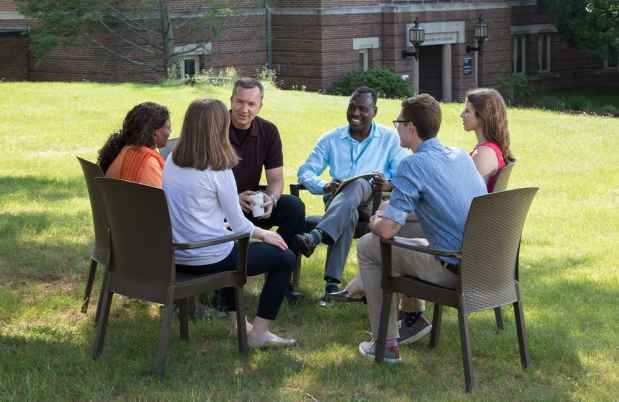Why does one person who experienced severe childhood adversity become homeless or addicted, while another with a similar background builds a loving family life and a thriving career? Is the answer in our genes, or perhaps in how trauma affects our genes?
A collaboration between McLean Hospital and The Connor Group Kids and Community Partners, an Ohio-based non-profit, is attempting to answer this question. The partnership leverages The Connor Group’s extensive community relationships in Dayton, Ohio, with the research expertise of McLean’s Kerry J. Ressler, MD, PhD.
Dr. Ressler is McLean’s chief scientific officer and chief of the Division of Depression and Anxiety Disorders. He is also one of the country’s foremost experts on trauma and runs McLean’s Neurobiology of Fear Laboratory. Ressler’s research focuses on epigenetics, the study of the biological mechanisms that turn genes “on” or “off,” resulting in their expression or silencing, which in turn can lead to physical and psychiatric illnesses. Trauma is believed to have its hand on these molecular switches.

“Childhood adversity and trauma are the best documented environmental risk factors for a range of psychiatric disorders, including suicidality, depression, and addiction, yet we know very little about what to do about this,” said Ressler. “Our goal is to better understand the epigenetic fingerprint of trauma so we can find more effective interventions and treatments for trauma-induced illnesses. Currently, understanding one’s trauma history is not large enough a factor in research and treatment.”
Studying Trauma’s Imprint
To that end, The Connor Group Kids and Community Partners has donated $625,000 to this research. McLean must match the gift in equal amount and is seeking additional philanthropic support to achieve this goal. “Our community has been particularly impacted by economic hardship and as an organization, we’ve invested in different projects to pull kids out of generational poverty,” said Larry Connor, a member of McLean’s National Council and managing partner of The Connor Group, which created the nonprofit. “When we learned about Kerry’s work, trying to explain why some people are resilient and others are not, we were intrigued. We are investors in people, and we want to fund life-changing work that can impact as many people as possible.”
The investment will fund a five-year, intergenerational study of 1,000 Ohio parents and their children, studying their DNA and interviewing them annually about their lives: What stress and trauma have they endured? What psychiatric or physical symptoms have they endured? Do they have attention difficulties or problems with aggression? Are they faring well in certain areas of life or struggling in others? The concept is to connect what Ressler and his colleagues are learning about participants’ genes with the way their lives unfold. The hope is to better understand how trauma’s imprint may be passed down from generation to generation. The funding also will support other cutting-edge epigenetic research by Ressler and his lab.
Better Treatments and Interventions
Dr. Ressler hopes the research will yield short-term and longer-term outcomes, starting with the discovery of an objective way to predict which people exposed to trauma will go on to develop illnesses like post-traumatic stress disorder (PTSD). By getting better at predicting trauma’s impact, clinicians could customize treatments for this vulnerable population. Further down the road would be the development of better medications and even technologies that could “edit” the epigenome of trauma-exposed people and prevent the development of trauma-related illness.
The Implications of the Research Are Far-Reaching
“If you have a set of biomarkers—that is, biological changes that can be measured—that are highly associated with trauma, this would be a tool to help emergency departments, pediatricians, foster programs, and other social service organizations intervene in more meaningful ways,” said Ressler.
Dr. Ressler added that he is tremendously grateful to The Connor Group Kids and Community Partners for their generosity. “We want to be able to help this generation of kids and the generations that follow.”
For more information or to support this initiative, please contact Elizabeth Fieux at 617.855.3453.
Media Requests
Journalist or member of the media? We are available 24/7 for media requests.



